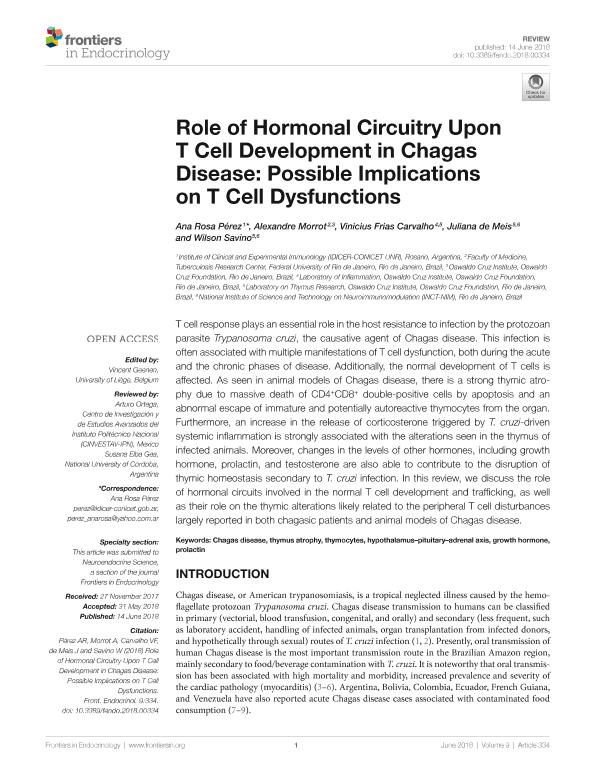Mostrar el registro sencillo del ítem
dc.contributor.author
Perez, Ana Rosa

dc.contributor.author
Morrot, Alexandre
dc.contributor.author
Carvalho, Vinicius Frias
dc.contributor.author
de Meis, Juliana
dc.contributor.author
Savino, Wilson
dc.date.available
2019-12-05T19:04:42Z
dc.date.issued
2018-06
dc.identifier.citation
Perez, Ana Rosa; Morrot, Alexandre; Carvalho, Vinicius Frias; de Meis, Juliana; Savino, Wilson; Role of hormonal circuitry upon T cell development in Chagas disease: Possible implications on T cell dysfunctions; Frontiers Research Foundation; Frontiers in endocrinology; 9; JUN; 6-2018; 1-8
dc.identifier.issn
1664-2392
dc.identifier.uri
http://hdl.handle.net/11336/91519
dc.description.abstract
T cell response plays an essential role in the host resistance to infection by the protozoan parasite Trypanosoma cruzi, the causative agent of Chagas disease. This infection is often associated with multiple manifestations of T cell dysfunction, both during the acute and the chronic phases of disease. Additionally, the normal development of T cells is affected. As seen in animal models of Chagas disease, there is a strong thymic atrophy due to massive death of CD4+CD8+ double-positive cells by apoptosis and an abnormal escape of immature and potentially autoreactive thymocytes from the organ. Furthermore, an increase in the release of corticosterone triggered by T. cruzi-driven systemic inflammation is strongly associated with the alterations seen in the thymus of infected animals. Moreover, changes in the levels of other hormones, including growth hormone, prolactin, and testosterone are also able to contribute to the disruption of thymic homeostasis secondary to T. cruzi infection. In this review, we discuss the role of hormonal circuits involved in the normal T cell development and trafficking, as well as their role on the thymic alterations likely related to the peripheral T cell disturbances largely reported in both chagasic patients and animal models of Chagas disease.
dc.format
application/pdf
dc.language.iso
eng
dc.publisher
Frontiers Research Foundation

dc.rights
info:eu-repo/semantics/openAccess
dc.rights.uri
https://creativecommons.org/licenses/by/2.5/ar/
dc.subject
CHAGAS DISEASE
dc.subject
GROWTH HORMONE
dc.subject
HYPOTHALAMUS-PITUITARY-ADRENAL AXIS
dc.subject
PROLACTIN
dc.subject
THYMOCYTES
dc.subject
THYMUS ATROPHY
dc.subject.classification
Inmunología

dc.subject.classification
Medicina Básica

dc.subject.classification
CIENCIAS MÉDICAS Y DE LA SALUD

dc.title
Role of hormonal circuitry upon T cell development in Chagas disease: Possible implications on T cell dysfunctions
dc.type
info:eu-repo/semantics/article
dc.type
info:ar-repo/semantics/artículo
dc.type
info:eu-repo/semantics/publishedVersion
dc.date.updated
2019-10-18T19:13:52Z
dc.journal.volume
9
dc.journal.number
JUN
dc.journal.pagination
1-8
dc.journal.pais
Suiza

dc.description.fil
Fil: Perez, Ana Rosa. Consejo Nacional de Investigaciones Científicas y Técnicas. Centro Científico Tecnológico Conicet - Rosario. Instituto de Inmunología Clinica y Experimental de Rosario. Universidad Nacional de Rosario. Facultad de Ciencias Médicas. Instituto de Inmunología Clinica y Experimental de Rosario; Argentina
dc.description.fil
Fil: Morrot, Alexandre. Fundación Oswaldo Cruz; Brasil. Universidade Federal do Rio de Janeiro; Brasil
dc.description.fil
Fil: Carvalho, Vinicius Frias. Fundación Oswaldo Cruz; Brasil
dc.description.fil
Fil: de Meis, Juliana. Fundación Oswaldo Cruz; Brasil
dc.description.fil
Fil: Savino, Wilson. Fundación Oswaldo Cruz; Brasil
dc.journal.title
Frontiers in endocrinology
dc.relation.alternativeid
info:eu-repo/semantics/altIdentifier/url/https://www.frontiersin.org/article/10.3389/fendo.2018.00334/full
dc.relation.alternativeid
info:eu-repo/semantics/altIdentifier/doi/http://dx.doi.org/10.3389/fendo.2018.00334
Archivos asociados
